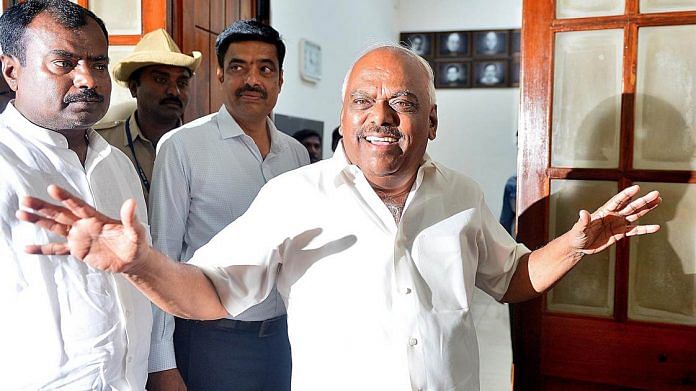New Delhi: The Supreme Court has directed the Karnataka assembly speaker to take a decision on the resignation of rebel Congress-Janata Dal (Secular) MLAs within Thursday, and submit his decision to the court Friday.
The order came on a plea filed by 10 of the disgruntled MLAs, who approached the Supreme Court this week and alleged speaker K.R. Ramesh Kumar was deliberately sitting on their resignations.
Earlier this week, Kumar rejected the resignation of eight MLAs on the grounds that they were “not in the prescribed format”. Six others who had resigned were asked to meet the speaker for a discussion about their decision.
The speaker, Kumar, has been accused of having partisan motivations for holding up the resignations by citing the format as grounds.
ThePrint got in touch with constitutional experts to explain the row. They upheld the supremacy of the speaker in taking a call on resignations, even as doubts were voiced about the time being taken.
The procedure of resignation
The format for an MLA’s resignation letter is laid down in Chapter XXII of the Rules for Procedure and Conduct of Business in the Karnataka Legislative Assembly. It goes as follows:
“To
The Speaker
Legislative Assembly
Bangalore.
Sir,
I hereby tender my resignation of my seat in the House with effect From…………………….
Yours faithfully,
Place…………..
Date……………..
Member of the House”
The letter should be drafted on the letterhead of the legislator.
Former Lok Sabha secretary general PDT Achary told ThePrint that it wasn’t the format per se, but the motivation for the resignation that was in question in the Karnataka crisis.
“Though the format of the resignation is small and can be easily corrected, it is the ‘voluntary’ and ‘genuine’ aspect of the resignation that is the point of contention,” he said.
Achary added that, according to Article 101(3) of the Constitution, the speaker may make an inquiry about the resignation and has absolute discretion in this matter.
Article 101(3) of the Constitution states that if the speaker is not satisfied that a resignation is voluntary or genuine, he/she is allowed to not accept it. The speaker may also make inquiries to determine whether the resignation is voluntary.
Asked about the MLAs’ plea to the top court, Achary said the “Supreme Court won’t go to the length of superseding the speaker in this matter as the speaker’s satisfaction is of ultimate importance”.
“As a group of people have resigned in Karnataka, so there are enough reasons to believe that the resignations are neither voluntary nor genuine,” he added.
“If the resignation has not been submitted in person, then the speaker can ask the MLAs to come in person and verify the voluntary part of the resignation,” said former Lok Sabha secretary general Subhash C. Kashyap.
However, he added, the delay in the Karnataka speaker’s call on the resignations created doubts. “Though the speaker is bound by no time limit to decide on resignations, taking such an unduly long time makes him look partisan,” he said.
Also read: As more Karnataka MLAs resign, do defectors win elections? Data holds the answer
Previous instances
There have been no earlier instances where the resignation of legislators was rejected due to the format of the letter.
However, there are examples of rejection on other grounds. In 2010, the Andhra Pradesh speaker had rejected the resignation of 129 MLAs, who sought to quit the house over the Telangana statehood issue.
In 2013, Lok Sabha Speaker Meira Kumar rejected resignations of 13 Andhra Pradesh MPs on the grounds of not being “voluntary or genuine”.
An ‘interesting’ resignation
According to a report in The Times of India, on 24 September 1951, the Lok Sabha was due to pass an expulsion motion against Congress MP from Bombay H.G. Mudgal over alleged corruption. However, on that day, Mudgal took part in the proceedings and then announced his resignation and left, before the motion could be put to a vote.
Mudgal’s unexpected move raised questions over whether the House could expel a person who was no longer a member. Then PM Jawaharlal Nehru subsequently moved an amendment to the resolution, urging that the words “and resolves that Shri Mudgal be expelled from the House” be substituted with “and resolves that Shri Mudgal deserved expulsion from the House and further that the terms of the resignation letter he gave to the Deputy Speaker at the conclusion of his statement constitute a contempt of this House which only aggravates his offence”.
Also read: Not BJP, 3 Congress-JD(S) leaders have brought Karnataka govt on the brink of collapse



